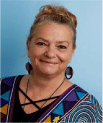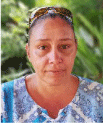Bridging the gap between science and indigenous cosmologies: Rheumatic Heart Disease Champions4Change
Vicki Wade A * and Maida Stewart AA Rheumatic Heart Disease Australia, Menzies School of Health Research, Charles Darwin University, Darwin, NT, Australia.

Vicki Tooditj Wade is a Noongar woman from the Goreng, Minang, Bibelmen and Wadjari tribes in the south west of Western Australia. Vicki has worked for over 40 years in health and during that time has held many senior positions at state and national levels. Vicki has spent many of these years working in improving the heart health of her people. Vicki sits on the Close the Gap steering committee, as well as several research and health committees across Australia. For her efforts, Vicki has received two prestigious awards: first, the CSANZ achievement award for working with First Nations people in heart health; and second, the Sidney Sax medal for her outstanding contribution to the health system in Australia. Vicki is the Director for RHDAustralia and hopes one day her long-time efforts will have contributed to closing the gap for her grandchildren and their children. |

Maida Stewart is a Wemba Wemba/Wergaia woman who has lived in the Northern Territory for over 29 years. For the past 18 years, Maida has been working as an Aboriginal Health Practitioner with the Danila Dilba Health Service in Darwin, Northern Territory, where she provided culturally appropriate and responsive health care to Aboriginal and Torres Strait Islander communities in the greater Darwin region. Maida has extensive experience in primary health care practice, and in health education and promotion. She’s worked in the areas of women’s health, child and maternal health, acute healthcare, mobile outreach and has been employed as a chronic disease coordinator. In 2018, Maida was awarded a Churchill Fellowship that focused on examining healthy housing in relation to primary prevention of ARF/RHD, which took her to Auckland on Aotearoa’s (New Zealand) North Island in early 2020 to investigate the Healthy Homes Initiative. Starting with RHDAustralia in March 2021 as the Champions4Change Project Coordinator, Maida is the main point of contact for the Champions4Change program. She works closely with senior cultural advisor, Vicki Wade to develop, coordinate, and implement strategies and resources that provide training and education to Champions in the program. By establishing and building meaningful relationships and encouraging networking between individuals and communities, Maida will work with Champions to prioritise their social and emotional well-being, and support their capacity building, community education, and health promotion activities. |
Microbiology Australia 43(3) 89-92 https://doi.org/10.1071/MA22030
Submitted: 19 July 2022 Accepted: 12 September 2022 Published: 3 October 2022
© 2022 The Author(s) (or their employer(s)). Published by CSIRO Publishing on behalf of the ASM. This is an open access article distributed under the Creative Commons Attribution-NonCommercial-NoDerivatives 4.0 International License (CC BY-NC-ND)
Abstract
Australia has articulated a commitment to eliminate rheumatic heart disease (RHD) by 2031. Business as usual will not achieve this goal. Diverse sectors need to work together in implementing complementary strategies towards this ambitious target. Rheumatic Heart Disease Australia’s ‘Champions4Change’ program is one important element that provides a novel and vital approach. Champions4Change is a culturally safe program of people living with acute rheumatic fever (ARF) and rheumatic heart disease (RHD). The Champions support each other, advocate for ending RHD, design education and awareness programs and inform resource and program development through their lived experiences. New approaches that acknowledge the complex and challenging environments in which ARF/RHD exist are required to eliminate RHD and improve care for those living with ARF/RHD. Approaches taken by the program include local engagement, improved capacity and opportunities for Champions and their communities to make self-determined decisions based on culturally informed information. This paper highlights success stories using culture and locally appropriate approaches to improve community knowledge and awareness of RHD. We describe the rationale, development and purpose of Champions4Change, illustrating how this is far more than a peer-support group, and provides benefits for health services and researchers, as well as empowering community members.
Keywords: acute rheumatic fever, culturally appropriate care, indigenous health, peer support, rheumatic heart disease.
References
[1] Walker, C and Peterson, CL (2021) Where does value lie in peer support? An exploratory discussion of the theories and methods underpinning effective research in peer support. Qual Health Res 31, 218–227.| Where does value lie in peer support? An exploratory discussion of the theories and methods underpinning effective research in peer support.Crossref | GoogleScholarGoogle Scholar |
[2] Fisher EB et al. (2018) Peer support in prevention, chronic disease management, and well-being. In Principles and Concepts of Behaviour Medicine. pp. 643–677. Springer, New York, NY.
| Crossref |
[3] Zimmerman, CT et al.. (2022) The roles of quality of life and family and peer support in feelings about transition to adult care in adolescents with gastroenterology, renal, and rheumatology diseases. J Pediatr Nurs 62, 193–199.
| The roles of quality of life and family and peer support in feelings about transition to adult care in adolescents with gastroenterology, renal, and rheumatology diseases.Crossref | GoogleScholarGoogle Scholar |
[4] Duley, P et al.. (2017) The Strong Family Program: an innovative model to engage Aboriginal and Torres Strait Islander youth and Elders with reproductive and sexual health community education. Health Promot J Aust 28, 132–138.
| The Strong Family Program: an innovative model to engage Aboriginal and Torres Strait Islander youth and Elders with reproductive and sexual health community education.Crossref | GoogleScholarGoogle Scholar |
[5] Liaw, ST et al.. (2016) Safe and effective cultural mentorship in general practice. Aust Fam Physician 45, 431–436.
[6] Bentley M (2008) Evaluation of the Peer Education component of the Young Nungas Yarning Together program. South Australian Community Research Unit, Flinders University.
[7] Munns, A et al.. (2016) The emerging role of the urban-based aboriginal peer support worker: a Western Australian Study. Collegian 23, 355–361.
| The emerging role of the urban-based aboriginal peer support worker: a Western Australian Study.Crossref | GoogleScholarGoogle Scholar |
[8] Read, C et al.. (2018) Qualitative evaluation of a complex intervention to improve rheumatic heart disease secondary prophylaxis. J Am Heart Assoc 7, e009376.
| Qualitative evaluation of a complex intervention to improve rheumatic heart disease secondary prophylaxis.Crossref | GoogleScholarGoogle Scholar |
[9] Belton, S et al.. (2018) Rheumatic heart disease in pregnancy: how can health services adapt to the needs of Indigenous women? A qualitative study. Aust N Z J Obstet Gynaecol 58, 425–431.
| Rheumatic heart disease in pregnancy: how can health services adapt to the needs of Indigenous women? A qualitative study.Crossref | GoogleScholarGoogle Scholar |
[10] Scheel, A et al.. (2018) The impact of a peer support group for children with rheumatic heart disease in Uganda. Patient Educ Couns 101, 119–123.
| The impact of a peer support group for children with rheumatic heart disease in Uganda.Crossref | GoogleScholarGoogle Scholar |
[11] Leda, S et al.. (2021) Improving the well-being for young people living with rheumatic heart disease: a peer support pilot program through Danila Dilba Health Service. Health Promot J Austr 33, 696–700.
| Improving the well-being for young people living with rheumatic heart disease: a peer support pilot program through Danila Dilba Health Service.Crossref | GoogleScholarGoogle Scholar |
[12] McPhail-Bell, K et al.. (2015) ‘We don’t tell people what to do’: ethical practice and Indigenous health promotion. Health Promot J Austr 26, 195–199.
| ‘We don’t tell people what to do’: ethical practice and Indigenous health promotion.Crossref | GoogleScholarGoogle Scholar |
[13] Haynes, E et al.. (2020) Voices behind the statistics: a systematic literature review of the lived experience of rheumatic heart disease. Int J Environ Res Public Health 17, 1347.
| Voices behind the statistics: a systematic literature review of the lived experience of rheumatic heart disease.Crossref | GoogleScholarGoogle Scholar |
[14] Hinchliffe, S et al.. (2018) Healthy publics: enabling cultures and environments for health. Palgrave Commun 4, 57.
| Healthy publics: enabling cultures and environments for health.Crossref | GoogleScholarGoogle Scholar |
[15] Mohamed J et al. (2022) Close the Gap Campaign Report 2022. Transforming power: voices for generational change. In A report prepared by the Lowitja Institute for the Close the Gap Steering Committee. https://humanrights.gov.au/our-work/aboriginal-and-torres-strait-islander-social-justice/publications/close-gap-2022
[16] Knowles R (2019) Heartfelt song beats back infection. National Indigenous Times. 16 July. https://nit.com.au/heartfelt-song-beats-back-infection/
[17] Francis, JR et al.. (2021) Single-view echocardiography by nonexpert practitioners to detect rheumatic heart disease: a prospective study of diagnostic accuracy. Circ Cardiovasc Imaging 14, e011790.
| Single-view echocardiography by nonexpert practitioners to detect rheumatic heart disease: a prospective study of diagnostic accuracy.Crossref | GoogleScholarGoogle Scholar |
[18] Mitchell, AG et al.. (2021) Using community-led development to build health communication about rheumatic heart disease in Aboriginal children: a developmental evaluation. Aust NZ J Public Health 45, 212–219.
| Using community-led development to build health communication about rheumatic heart disease in Aboriginal children: a developmental evaluation.Crossref | GoogleScholarGoogle Scholar |


